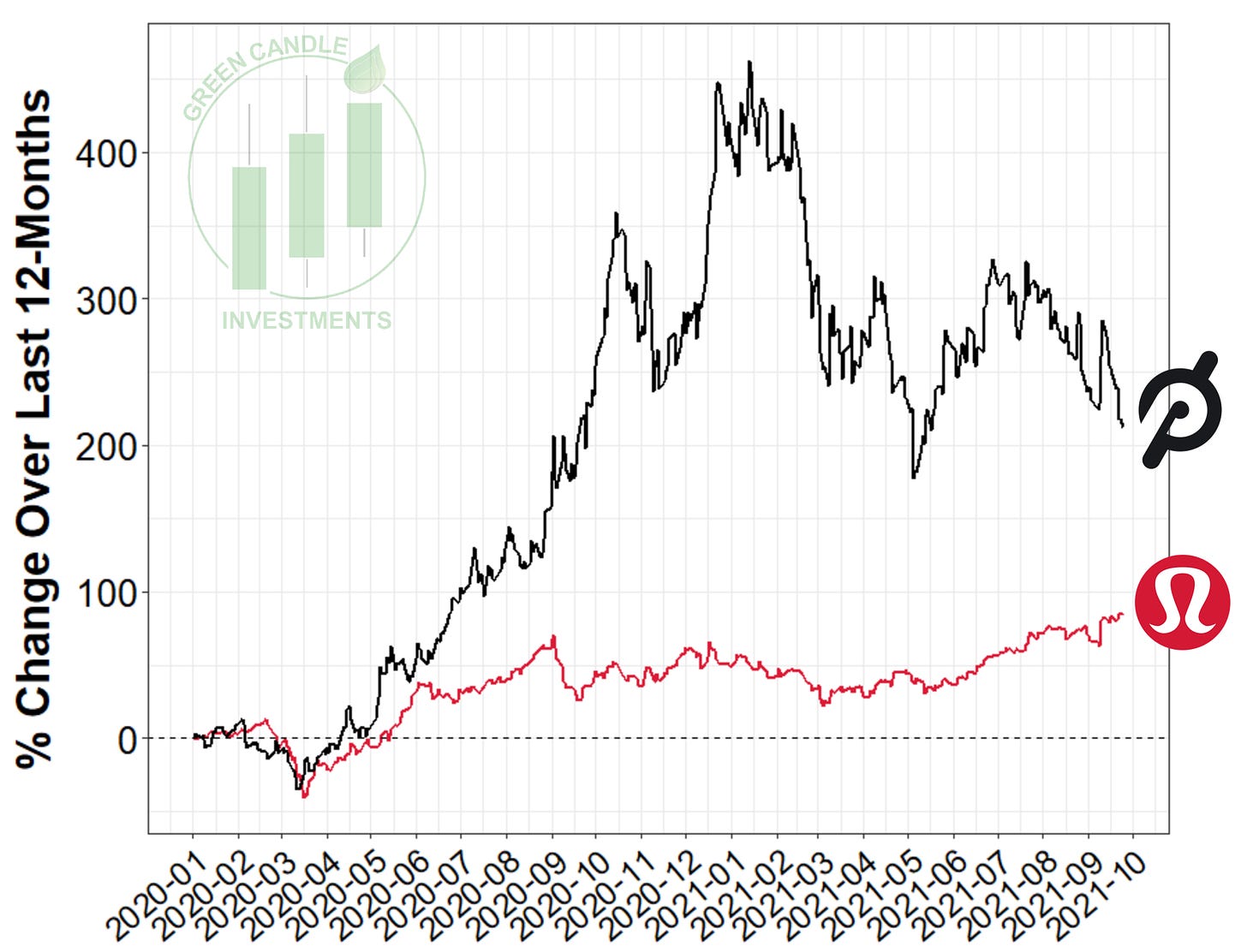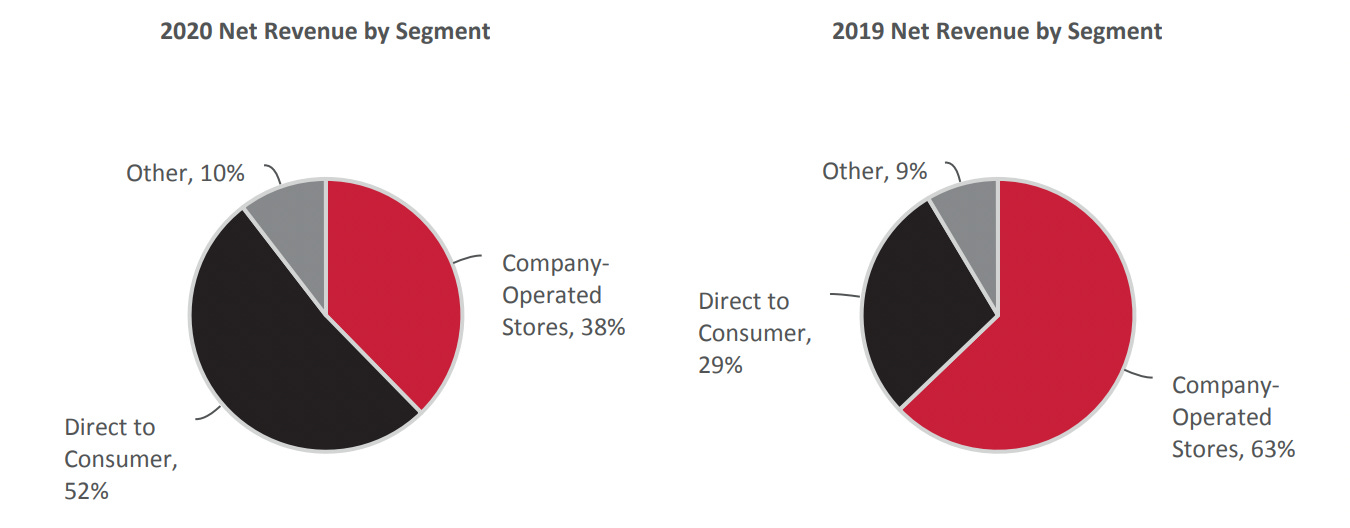Lululemon Athletica (Ticker: LULU) - Brief Breakdown
In our Brief Breakdowns, we pick a stock and take opposite sides – one of us presents the bullish argument and the other presents the bearish argument.
If you haven’t already, subscribe to our newsletter here to get our articles directly to your inbox and follow us on Twitter and Instagram!
Company Description
Lululemon Athletica designs, distributes, and retails athletic apparel and accessories for women, men, and female youth. It operates stores and direct to consumer sections of its business where it originally sold yoga pants and other yoga wear, and has since expanded to sell athletic wear. Lululemon also provides various fitness-related accessories. There are 491 stores internationally as well as its online store that operates globally.
Quantitative Analysis
At the time of this writing (9/26/2021), LULU is trading at $432.61 with a 52 week range of $269.28 - $437.32 and a market cap of $58.41B. In Q2 of their fiscal year 2021, LULU’s revenue grew to $1.5 billion, up 61% year over year. LULU’s diluted earnings per share was $1.59 and adjusted earnings per share was $1.65. Lululemon’s operating margin increased by 110 basis points and adjusted operating margin increased by 160 basis points. Return of equity (ROE: Net Income / Total Equity *100) of LULU is 32.95% and net margin (net income / revenue) is 14.96%. This financial analysis was done using financialstockdata.com (become a beta tester here). You can view LULU’s 2021 Q2 earnings here and their 2020 Annual Report here.
Qualitative Analysis
Lululemon has some of the highest quality apparel and is regarded as one of the finest clothing companies in the fitness and athleisure realm. Lululemon also creates high quality and comfortable men’s slacks and with the movement to more remote work and more casual clothing in the office, LULU has a strong hold on comfortable yet professional looking clothing. Although there are large brands that have athletic wear such as Nike and Adidas, Lululemon has focused on the unique segments of the market (such as yoga-specific clothing) and is looking to expand into other areas of athletic wear. LULU will need to obtain more market share of general athletic wear from large brand name companies - a daunting task given the competition in the apparel industry.
Bullish Thesis
Here are three points to support the bullish thesis:
Brand Loyalty in Yoga Wear: Although yoga is one subset of sports and athletic wear, Lululemon has seemed to perform well in this area. Although Lulu has increased competition in the yoga pants realm, they have strong brand loyalty in this sector of their business. This is shown by the increase in the direct to consumer purchases. The brand loyalty is huge in an increased work from home environment and more comfortable clothing becoming the norm.
Post-pandemic Health Consciousness: We used this argument last week in our article about Peloton, each person is now becoming more health conscious. There is a study that linked extremely high BMIs (45 or greater) with 61% increased risk of death and 33% increased risk of hospitalization compared with healthy weight patients. The trend to becoming more in shape and health conscious could do wonders for Lululemon and now with adding exercise equipment, Lulu looks primed to take advantage of this trend.
Mirror Acquisition: Lululemon has made its business around clothing and apparel with the occasional piece of fitness equipment. Now after acquiring a company called Mirror it can begin getting into the interactive fitness equipment space. There is growing competition in the area and Peloton is already a major player in the industry, but Lululemon has a familiar brand name to potential consumers and can poach new customers in a very new industry. The interactive fitness space leaves room to revolutionize and its an industry that has not been around long enough to gain brand loyalty.Lululemon isn’t a company that specializes in equipment but the brand name could prove to hold weight going forward.
Bearish Thesis
Here are three points to support the bearish thesis:
Competition: The apparel industry is certainly not lacking in competitive companies. In athletic apparel, Lululemon must compete with giants like Nike, Adidas, and Under Armour. In non-athletic apparel, they face stiff competition from the likes of Banana Republic, The Gap, and Old Navy, to name a few. While Lululemon is quickly becoming a household name in the U.S., they will need to do more to compete with other well-established brand names. Until then, investors may be better off parking their money in brand name apparel companies with wider moats (for example, Nike).
Overvalued Stock Prices: Seeking Alpha analysts have expressed concern that Lululemon’s current stock value is overpriced given their likely growth over the next 5-years. According to the analysis, the stock is currently priced as if the company will grow at ~35% per year. In the more likely scenario that the company’s growth will slow post pandemic, the stock value will likely drop to more appropriate levels. If growth through 2026 comes in at 20% per year, the Seeking Alpha analyst sees shares having a fair value more than 53% below current prices. If you’re a long term investor, you may not want to jump into Lululemon until you see whether the company is able to maintain current levels of growth as the economy recovers post-pandemic.
High Cost Apparel in an Economic Downturn: A major knock against Lululemon’s apparel is the relatively high cost. Unfortunately for Lululemon, the COVID pandemic and policy decisions made over the last year have left us in a macro environment that may make consumers less likely to spend large sums of money on clothing. Indeed, consumer price index (CPI) - which is widely used as a measure of inflation in the U.S. - continues to exceed 5% year-over-year increases, well above the Federal Reserve's target inflation rate of 2%. Inflationary trends seem likely to continue given recent statements from the Federal Reserve. If this is the case, consumers may be less likely to spend money on apparel that they can get from a competitor for less.
Learn more about Lululemon here. Stay up to date on Green Candle by subscribing to our newsletter and following us on Twitter and Instagram!
If you’re new to stock investing, check out our introduction to stock investing series:
Have a great week everyone,
Brandon & Daniel
Disclosure: The article was written by Daniel Kuhman and Brandon Keys, and it expresses the author's own opinions. They are not receiving compensation for it. They have no business relationships with any company whose stock is mentioned in this article. The information presented in this article is for informational purposes only and in no way should be construed as financial advice or recommendation to buy or sell any stock. Brandon and Daniel are not financial advisors. We encourage all readers to do further research and do your own due diligence before making any investments.






